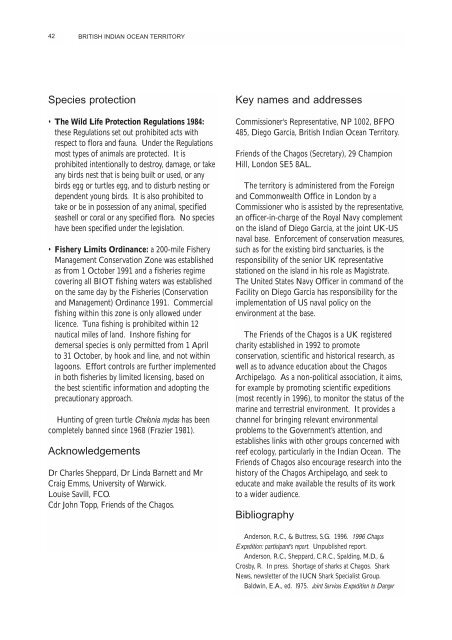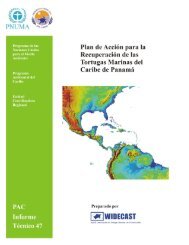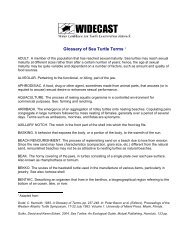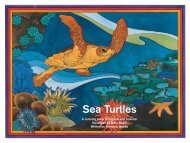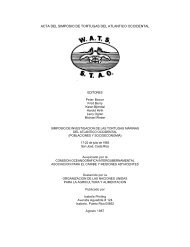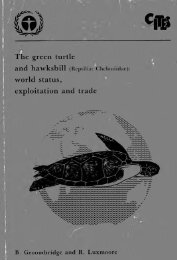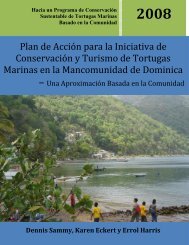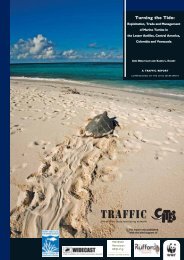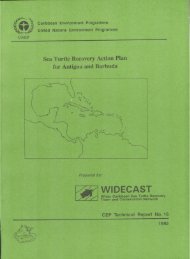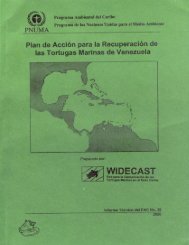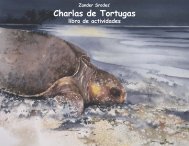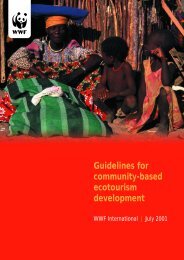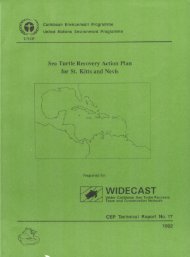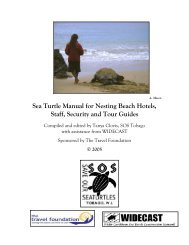Biodiversity: the UK Overseas Territories - WIDECAST
Biodiversity: the UK Overseas Territories - WIDECAST
Biodiversity: the UK Overseas Territories - WIDECAST
Create successful ePaper yourself
Turn your PDF publications into a flip-book with our unique Google optimized e-Paper software.
42 BRITISH INDIAN OCEAN TERRITORY<br />
Species protection<br />
• The Wild Life Protection Regulations 1984:<br />
<strong>the</strong>se Regulations set out prohibited acts with<br />
respect to flora and fauna. Under <strong>the</strong> Regulations<br />
most types of animals are protected. It is<br />
prohibited intentionally to destroy, damage, or take<br />
any birds nest that is being built or used, or any<br />
birds egg or turtles egg, and to disturb nesting or<br />
dependent young birds. It is also prohibited to<br />
take or be in possession of any animal, specified<br />
seashell or coral or any specified flora. No species<br />
have been specified under <strong>the</strong> legislation.<br />
• Fishery Limits Ordinance: a 200-mile Fishery<br />
Management Conservation Zone was established<br />
as from 1 October 1991 and a fisheries regime<br />
covering all BIOT fishing waters was established<br />
on <strong>the</strong> same day by <strong>the</strong> Fisheries (Conservation<br />
and Management) Ordinance 1991. Commercial<br />
fishing within this zone is only allowed under<br />
licence. Tuna fishing is prohibited within 12<br />
nautical miles of land. Inshore fishing for<br />
demersal species is only permitted from 1 April<br />
to 31 October, by hook and line, and not within<br />
lagoons. Effort controls are fur<strong>the</strong>r implemented<br />
in both fisheries by limited licensing, based on<br />
<strong>the</strong> best scientific information and adopting <strong>the</strong><br />
precautionary approach.<br />
Hunting of green turtle Chelonia mydas has been<br />
completely banned since 1968 (Frazier 1981).<br />
Acknowledgements<br />
Dr Charles Sheppard, Dr Linda Barnett and Mr<br />
Craig Emms, University of Warwick.<br />
Louise Savill, FCO.<br />
Cdr John Topp, Friends of <strong>the</strong> Chagos.<br />
Key names and addresses<br />
Commissioner's Representative, NP 1002, BFPO<br />
485, Diego Garcia, British Indian Ocean Territory.<br />
Friends of <strong>the</strong> Chagos (Secretary), 29 Champion<br />
Hill, London SE5 8AL.<br />
The territory is administered from <strong>the</strong> Foreign<br />
and Commonwealth Office in London by a<br />
Commissioner who is assisted by <strong>the</strong> representative,<br />
an officer-in-charge of <strong>the</strong> Royal Navy complement<br />
on <strong>the</strong> island of Diego Garcia, at <strong>the</strong> joint <strong>UK</strong>-US<br />
naval base. Enforcement of conservation measures,<br />
such as for <strong>the</strong> existing bird sanctuaries, is <strong>the</strong><br />
responsibility of <strong>the</strong> senior <strong>UK</strong> representative<br />
stationed on <strong>the</strong> island in his role as Magistrate.<br />
The United States Navy Officer in command of <strong>the</strong><br />
Facility on Diego Garcia has responsibility for <strong>the</strong><br />
implementation of US naval policy on <strong>the</strong><br />
environment at <strong>the</strong> base.<br />
The Friends of <strong>the</strong> Chagos is a <strong>UK</strong> registered<br />
charity established in 1992 to promote<br />
conservation, scientific and historical research, as<br />
well as to advance education about <strong>the</strong> Chagos<br />
Archipelago. As a non-political association, it aims,<br />
for example by promoting scientific expeditions<br />
(most recently in 1996), to monitor <strong>the</strong> status of <strong>the</strong><br />
marine and terrestrial environment. It provides a<br />
channel for bringing relevant environmental<br />
problems to <strong>the</strong> Government’s attention, and<br />
establishes links with o<strong>the</strong>r groups concerned with<br />
reef ecology, particularly in <strong>the</strong> Indian Ocean. The<br />
Friends of Chagos also encourage research into <strong>the</strong><br />
history of <strong>the</strong> Chagos Archipelago, and seek to<br />
educate and make available <strong>the</strong> results of its work<br />
to a wider audience.<br />
Bibliography<br />
Anderson, R.C., & Buttress, S.G. 1996. 1996 Chagos<br />
Expedition: participant's report. Unpublished report.<br />
Anderson, R.C., Sheppard, C.R.C., Spalding, M.D., &<br />
Crosby, R. In press. Shortage of sharks at Chagos. Shark<br />
News, newsletter of <strong>the</strong> IUCN Shark Specialist Group.<br />
Baldwin, E.A., ed. l975. Joint Services Expedition to Danger


